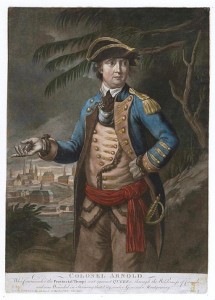For some people accused of treason, history has left at least some questions. Aaron Burr and the Rosenbergs were found guilty, but there are still questions as to whether their guilt was proven beyond a reasonable doubt. The same cannot be said for Benedict Arnold, a name that has become synonymous in American history with traitor since the birth of this nation.
 There is also no question about the depth of his treachery. Arnold commanded the American forces at West Point, and his plan was to turn over the fort there to the British. Had he done so, the British might easily have captured George Washington. Even if the future first president had escaped, the British would have controlled the Hudson crossings. Supplies would have been cut off to Washington’s army, and the Revolution would have abruptly ended in disaster for the colonists.
There is also no question about the depth of his treachery. Arnold commanded the American forces at West Point, and his plan was to turn over the fort there to the British. Had he done so, the British might easily have captured George Washington. Even if the future first president had escaped, the British would have controlled the Hudson crossings. Supplies would have been cut off to Washington’s army, and the Revolution would have abruptly ended in disaster for the colonists.
While it is clear what Benedict Arnold did, it isn’t as clear as to why. Shortly after he switched sides, Arnold said the war had been “a defensive one until the French joined the combination.” Because of that, he said his eyes were opened and he saw how dangerous were the “insidious offers of the French … the enemy of the Protestant faith.”
Almost no one believed that explanation then, and less do now. Arnold had never had problems with the French. His statements oddly mimicked the words of Loyalist propaganda writer, William Smith.
In fact, the events that led him to betrayal reflect a true patriot rather than conspirator. Along with Ethan Allen, he captured Fort Ticonderoga in 1775. In September of that year, he led 1,000 men on a wilderness expedition to Quebec City. Though he lost 40 percent of his troops to death or desertion, he persisted in the siege until driven back by 100,000 British troops.
In the summer of 1776, Arnold supervised the construction of a fleet on Lake Champlain and organized a navy. A year later, when the British swept down from Canada, he led the crucial charge at the Battle of Saratoga, leading to the surrender of the British. Washington honored his trusted major for bravery and leadership afterwards.
One element that may have affected Arnold was the string of disappointments that followed these victories. He and Ethan Allen sharply disagreed on a number of occasions. Allen suggested Arnold had overstepped his orders in failing to capture Quebec. His detractors then accused him of confiscating provisions from Montreal merchants for his own profit.
They pledged their lives, their fortunes, and their sacred honor so that we could be free!
This and other incidents left Benedict Arnold bitter, only to be made worse when he was passed over for a promotion to major general. Because his injuries left him unfit for combat, Washington appointed him military governor of Philadelphia. In that role, he was also accused of actions to fill his own pockets. In May 1779, he wrote Washington, saying that he had “little expected to meet the ungrateful returns I have received from own countrymen.”
Charges against him culminated in a court martial in December 1779. The court found insufficient evidence to convict Arnold of anything but two minor misdemeanors. The court did, however, recommend that Washington reprimand him, which he did.
For many years, historians assumed it was the court martial that pushed America’s most infamous traitor over the edge. Then in 1941, historian Carl Van Doren found letters from Arnold to British headquarters written months before the court martial. In that correspondence, Arnold asked for 20,000 pounds to surrender West Point to the British.
In the end, Arnold seems to have been motivated by the most basic of reasons – money. His new nineteen-year-old wife had expensive tastes, and her Tory friends influenced him greatly. There was no chivalry for Arnold when his plot was discovered, as he immediately ditched his teenage bride in an effort to protect himself.
The greed for money didn’t end after he changed sides. Arnold’s first action in a British uniform was to present a note for 10,000 pounds and demand immediate payment. Ten years after the war and living in England, Arnold was still writing, demanding payment he claimed to have never gotten.
Over 200 years later, our country still finds itself with leaders of great potential willing to sell out America in pursuit of wealth and popularity. It is unfortunate that this aspect of our history is the one that our government seems to feel the most compelled to repeat.
©2012 Off the Grid News
 Off The Grid News Better Ideas For Off The Grid Living
Off The Grid News Better Ideas For Off The Grid Living


